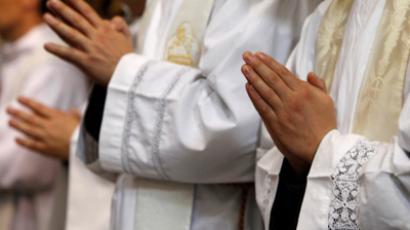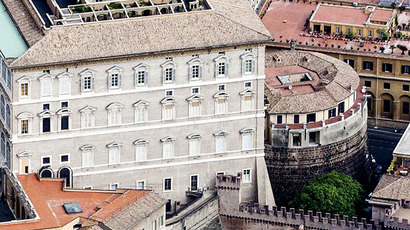Pope Francis ‘excommunicates’ Italian mafia

Calling the practices of Italian 'Ndrangheta crime group the “adoration of evil,” Pope Francis said the Mafiosi “are excommunicated” from God and the Catholic Church, in his address to tens of thousands of people in Calabria, southern Italy.
“Those who in their lives follow this path of evil, as Mafiosi do, are not in communion with God. They are excommunicated,” Pope Francis said as cited by Reuters.
“This evil must be fought against, it must be pushed aside. We must say no to it,” Francis said, promising that the Vatican would apply all efforts to combat such activity.
Francis condemned 'Ndrangheta as the “adoration of evil and contempt of the common good.”
“Repent! There is no time to avoid ending up in hell, which is what awaits you if you do not change course,” the Pope stated after holding a vigil as he visited Castrovillari prison in Calabria, a region infested by organized crime, Il Sole 24 Ore reports.
Pope Francis condemns #Ndrangheta on its own turf. #Calabriapic.twitter.com/GnySV9MqHt
— Sanne de Boer (@ZzItalia) June 21, 2014
‛Ndrangheta activity is centered in Calabria. The group became the most powerful syndicate of Italy in the late 1990s and early 2000s. Although tied to the Sicilian Mafia, 'Ndrangheta operates independently from the Sicilians. It is believed that drug trafficking, extortion and money-laundering activities of the organization equate to least 3 percent of Italy's GDP, with a revenue of 53 billion Euros annually.
“If it were not part of Italy, Calabria would be a failed state. The 'Ndrangheta organized crime syndicate controls vast portions of its territory and economy, and accounts for at least three percent of Italy's GDP (probably much more) through drug trafficking, extortion and usury,” Patrick Truhn, US Consul General in Naples said previously in a confidential report, revealed by WikiLeaks.
International links of the organization particularly with Latin American countries helped the 'Ndrangheta dominate global cocaine trade.
Nicola Gratteri, a prosecutor tracing the organization's international reach, told the Guardian that some 80 percent of cocaine in Europe is smuggled by Calabrian mobsters. “Altogether in the world, I would say it has maybe 10,000 members,” he added.
“The 'Ndrangheta,” Enzo Macri from National Antimafia Directorate says, represents the “globalisation” of Italian organised crime. “The Colombians prefer to deal with the Calabrians,” says Macri. “They are much more reliable. They don't talk. And they pay on time.”
#Papa Francesco a Messa Sibari: la ‘ndrangheta è adorazione del male; mafiosi scomunicati http://t.co/DBmbPUkUxapic.twitter.com/DinY35GUdv
— AgenSIR (@agensir) June 21, 2014
This attack on one of Italy’s most dangerous crime syndicates is Pope Francis' latest effort in his crusade to fight corruption. The pontiff is also trying to reform the Vatican Bank after two years ago reports emerged implicating the secret banking institution of laundering Sicilian mafia bosses’ riches.
READ MORE: Unholy mess: Vatican amidst mafia money-laundering scandal
Following the disclosure, Pope Francis' predecessor Benedict appointed a five-person papal commission to investigate the activities of the bank, just before his resignation. Last year, the Vatican Bank, known as the Institute for Religious Works, for the first time released its annual financial report to the public with an aim to create more financial transparency. Francis later reshuffled the commission while the ongoing probe resulted in closure of several hundreds of accounts and vetting thousands more.
The roots of Italian organized crime date back to the 1500s. Presently, there are five main known mafia-style organizations in Italy – the Cosa Nostra of Sicily, 'Ndrangheta of Calabria, Camorra of Naples, as well as relatively new Stidda and Sacra Corona Unita of Puglia.














